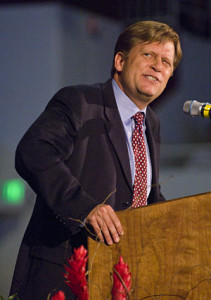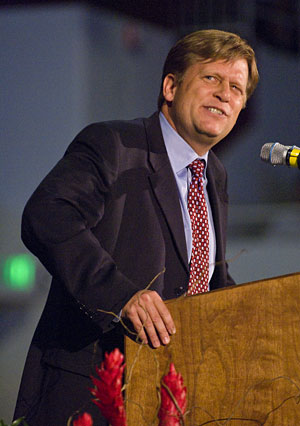U.S. Ambassador to Russia Michael McFaul ’86 M.A. ’86 will step down from his current position and return to Stanford at the end of the month following the conclusion of the Winter Olympics in Sochi, according to an announcement made Tuesday morning.

McFaul, who worked at Stanford as a professor of political science and as a senior fellow at the Freeman Spogli Institute for International Studies (FSI) before assuming his post in Moscow in 2012, cited a desire to reunite with his family — who returned to California last summer as the principal reason for his departure.
“We tried to make a 9,000 kilometer commute work for our family,” McFaul wrote in a blog post. “But after seven months of separation, I simply need to be with my family again…It’s time for us to be reunited.”
McFaul added that Stanford would be his “base of operations” for “the immediate future,” though he plans to remain involved with some specific Obama administration projects as well. According to FSI spokesman Adam Gorlick, McFaul will continue as an FSI senior fellow.
“Ambassador McFaul’s return is a sterling opportunity for Stanford and FSI,” said FSI Director Mariano-Florentino Cuéllar M.A. ’96 Ph.D. ’00 in a statement. “We hope to engage him in the Institute’s work on governance, technology and security. His unique experience as a diplomat and a leading scholar are enormous assets to our centers and educational programs, and to the entire university.”
McFaul’s tenure in Moscow, which continued an affiliation with the Obama administration dating back to the 2008 presidential campaign, has been a tumultuous one. His meetings with opposition politicians during a cycle of anti-government protests shortly after his arrival elicited extensive criticism from the Kremlin, and U.S.-Russia relations reached a nadir last year with Russia’s granting of asylum to Edward Snowden and the subsequent cancellation of a summit meeting between the two country’s leaders.
Nevertheless, McFaul — often credited as the architect of the “reset” in relations between Washington and Moscow — also played an integral role in major achievements by the Obama administration with regards to Russia, such as the New START Treaty, Russia’s accession to the World Trade Organization, negotiations with Iran and efforts to facilitate the resupply of troops in Afghanistan.
“President Obama is deeply grateful for Ambassador McFaul’s extraordinary service over the last five years,” said Deputy National Security Adviser Ben Rhodes in a statement. “Mike has been tireless in advocating for the universal values that America stands for around the world, reaching out to civil society and recognizing the right of every voice to be heard.”
Contact Marshall Watkins at mtwatkins ‘at’ stanford.edu.
